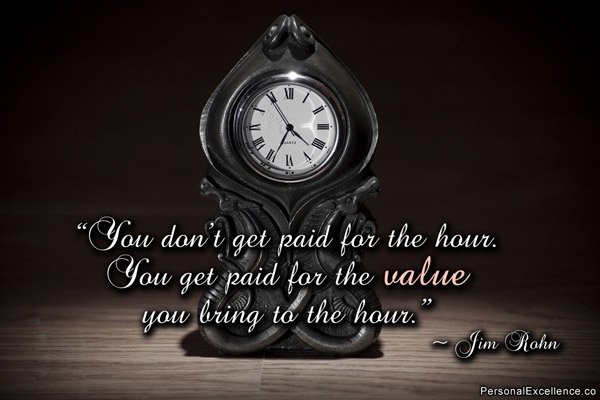If you want to get paid what you’re worth and leverage your time, stop trading your time for money.
The billable hour legacy is a salary-based equation. Within this flawed system, the amount that a professional is paid does not have a direct correlation to the quality or value of the services they provide.
As Jim Rohn, Author and Motivational Speaker says, “You don’t get paid for the hour. You get paid for the value you bring to the hour.”
Thanks Jim, but what exactly does that mean?!
In a service-based business, value seems to be an elusive, intangible concept for most people. I have had numerous conversations with clients in professional services who struggle to answer this tough question, “What value do you provide your clients?”
The reason why I ask this question is because it is paramount to your success at selling yourself as a service, and getting paid what you’re worth. If you don’t know what your value is and you don’t own that value, then you will continue to struggle in your business.
If you are a coach or consultant for example, these services inherently have no value – unless you make it relevant to people’s needs.
According to Paul Roetzer, author and founder of PR 20/20, the value-based pricing model takes multiple variables into account:
- Estimated hours – how many hours will it take to complete the project?
- Hourly revenue target – how much revenue do you need to generate per hour of client work to achieve profit goals?
- Costs – are there any costs associated with the production and delivery that will be built into the price?
- Perceived value – what is fair market value? What are clients willing to pay for the service?
- Builder vs driver – is the service designed to set the foundation for future success (builder) or to produce short-term results (driver)? This directly affects the perceived value and what clients are willing to pay.
- Loss leader – is the service designed to entice first-time clients with attractive pricing? Is it proven to create cross-sell and up-sell opportunities?
I’ll add these 3 additional variables into the mix, specifically for those of us selling ourselves as our service:
- People – are you delivering a unique offering? How do you differentiate yourself from the competition?
- Relevance – is your offering relevant to your ideal client’s specific needs? Are you positioning your offer as a solution to your client’s problem?
- Connection – what is your relationship with your customer? What is your level of customer engagement and customer service?
Generally, people don’t purchase based on price (some exceptions apply ie. commodities). Most people engage your services based on value or rather their perception of value. When relating this back to your business, here are some factors that have a higher perception of value:
- Specialty – do you offer a highly specialized service that isn’t readily available?
- Premium time – do you offer personal, customized, one-on-one client face-time?
- Endorsements – have you been endorsed by an industry thought-leader? Have glowing client testimonials? Success-based case studies?
- Conviction – do you have the personal presence, conviction, and clarity about the benefits of your offering?
- Celebrity status – are you a published author? Award-winner? Media darling?
- Influence – what’s your level of influence and leadership in your specialty? Do people listen to you and respect what you say? Are you a proven expert in your field?
Your challenge: Own your value, charge your worth and position yourself for the sale. Once you step into your power and ask for what you want, you will get what you deserve and it will feel so liberating! How would making this mindset shift change your life and your business? Drop by my Facebook page and tell me!
To get paid what you’re worth and leverage your time, stop trading your time for money.
